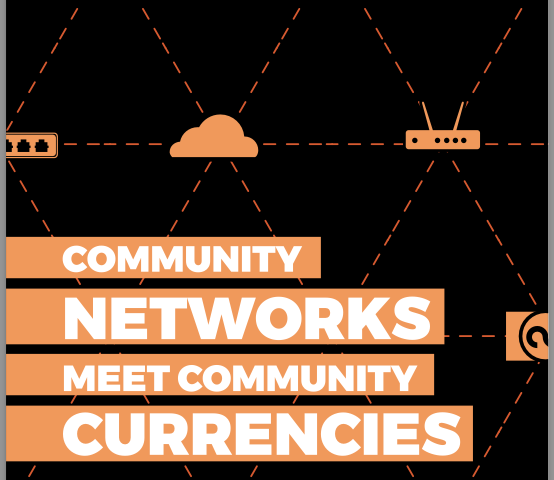April 2023
Senka Hadzic

In April, 2023 we released the “Community Networks Meet Community Currencies” manual with the Association for Progressive Communications (APC), to provide guidelines to those who would like to launch a combination of a community network and a local community currency.
APC’s Local Networks (LocNet) initiative in partnership with Rhizomatica is a collective effort that contributes to creating an ecosystem of community networks and other community-led connectivity initiatives. LocNet is fostering Communities of Practice (CoPs) as spaces for sharing knowledge and joining forces to pursue both individual and collective goals. We were invited to contribute to the CoP on Sustainability, where local economy and local currencies emerged as a common interest by the participating partners.
The manual can be seen as a field guide for building bottom-up infrastructure, specifically an intervention to bootstrap:
- A community inclusion currency (voucher) to amplify local markets (this system is powered by the Grassroots Economics Community Inclusion Currency Platform).
- A local community network and a local content and services platform to move control and ownership of the network to actors in the community and amplify the creation, sharing and curation of locally relevant content and services (this system is powered by the iNethi platform).
Underpinning this guide is the belief that a mutual credit-based community voucher or currency integrated with a community-owned network and a local content server could incentivise users to become better custodians of the commons infrastructure. This in turn could lead to generation of more locally relevant digital content, and expansion, use, and stability of a community voucher to support wider local markets that embrace local digital and physical goods and services.
Part 1 of the manual is focused on community inclusion currencies (vouchers) and provides case studies to understand their use and adoption, as well as steps for the voucher creation process: awareness, training, support creation and audit, review and launch preparation, launch and continued support.
Part 2 is focused on the iNethi platform and includes a step-by-step guide to building an iNethi server whether it is about building the services on the iNethi platform and co-creating content, or launching a wireless ISP (WISP) and also charge for internet access through Wi-Fi coupons/vouchers. iNethi provides all the tools needed to operate a small WISP/ community-owned network.
We believe that having both an economic commons as well as a network commons complement one another to ensure there is both growth in the local economy in a community and growth of widely available affordable internet and locally relevant content and services.
The manual was created under the assumption that a mix of centralised and decentralised infrastructures can co-exist; a government can ensure that common spaces are protected and created where more community-based or decentralised facilities or services can exist, such as common spaces where community markets can trade, or government-subsidised internet backhaul links which community networks can grow from. Governments can also create regulation that allows decentralised infrastructure and services to flourish, such as regulation that creates low-cost or zero-cost spectrum or network licences for community networks to be built, or regulation that allows community currencies to easily be created given a set of conditions that are there to protect citizens from fraud or abuse by scams or fraudsters.